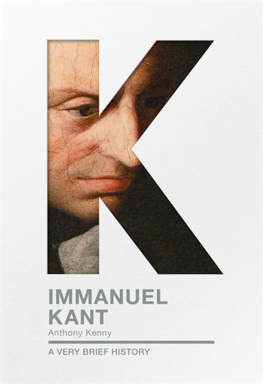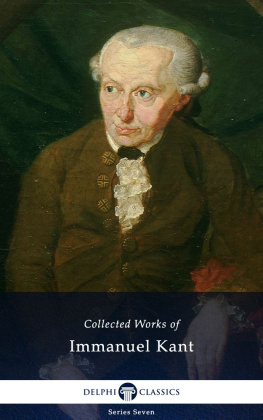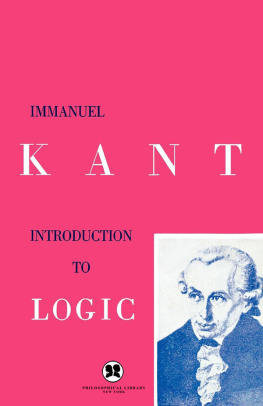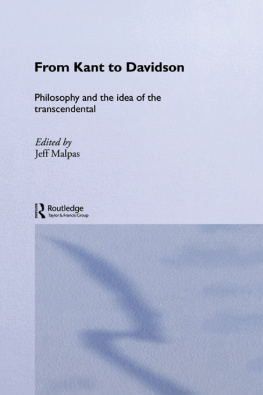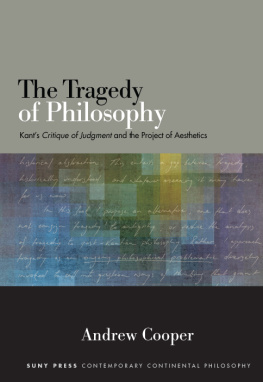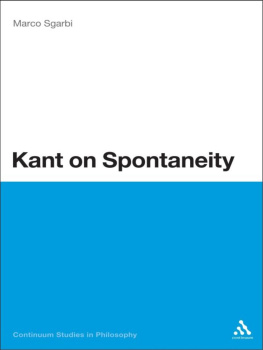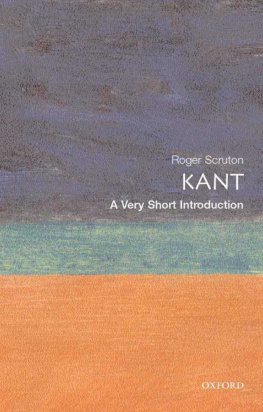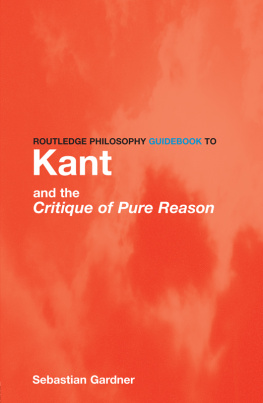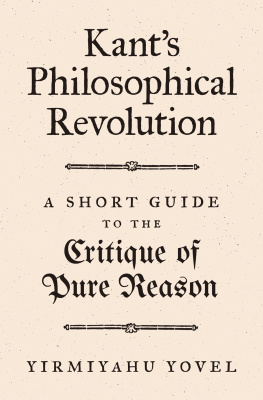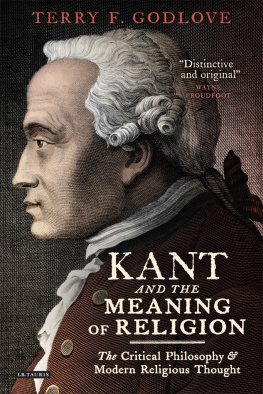Immanuel Kant
Key Concepts
Key Concepts
Theodor Adorno: Key Concepts
Edited by Deborah Cook
Alain Badiou: Key Concepts
Edited by A. J. Bartlett and Justin Clemens
Pierre Bourdieu: Key Concepts
Edited by Michael Grenfell
Gilles Deleuze: Key Concepts
Edited by Charles J. Stivale
Michel Foucault: Key Concepts
Edited by Dianna Taylor
Jrgen Habermas: Key Concepts
Edited by Barbara Fultner
Martin Heidegger: Key Concepts
Edited by Bret W. Davis
Immanuel Kant: Key Concepts
Edited by Will Dudley and Kristina Engelhard
Merleau-Ponty: Key Concepts
Edited by Rosalyn Diprose and Jack Reynolds
Jacques Rancire: Key Concepts
Edited by Jean-Philippe Deranty
Wittgenstein: Key Concepts
Edited by Kelly Dean Jolley
First published 2011 by Acumen
Published 2014 by Routledge
2 Park Square, Milton Park, Abingdon, Oxon OX14 4RN
711 Third Avenue, New York, NY 10017, USA
Routledge is an imprint of the Taylor & Francis Group, an informa business
Editorial matter and selection, 2011 Will Dudley and Kristina
Engelhard. Individual contributions, the contributors.
This book is copyright under the Berne Convention.
No reproduction without permission.
All rights reserved. No part of this book may be reprinted or reproduced or utilised in any form or by any electronic, mechanical, or other means, now known or hereafter invented, including photocopying and recording, or in any information storage or retrieval system, without permission in writing from the publishers.
Notices
Practitioners and researchers must always rely on their own experience and knowledge in evaluating and using any information, methods, compounds, or experiments described herein. In using such information or methods they should be mindful of their own safety and the safety of others, including parties for whom they have a professional responsibility.
To the fullest extent of the law, neither the Publisher nor the authors, contributors, or editors, assume any liability for any injury and/or damage to persons or property as a matter of products liability, negligence or otherwise, or from any use or operation of any methods, products, instructions, or ideas contained in the material herein.
ISBN: 978-1-84465-238-9 (hardcover)
ISBN: 978-1-84465-239-6 (paperback)
British Library Cataloguing-in-Publication Data
A catalogue record for this book is available from the British Library.
Designed and typeset in Classical Garamond and Myriad.
Contents
Will Dudley and Kristina Engelhard
Gnter Zller
Emily Carson
Dietmar Heidemann
Michelle Grier
Paul Guyer
Kenneth R. Westphal
Georg Mohr and Ulli F. H. Rhl
Katrin Flikschuh
Kirk Pillow
John Zammito
Stephen Houlgate
Patrick Frierson
Emily Carson is Associate Professor of Philosophy at McGill University.
Will Dudley is Professor of Philosophy at Williams College.
Kristina Engelhard is Assistant Professor of Philosophy at the University of Cologne.
Katrin Flikschuh is Reader in Modern Political Theory at the London School of Economics.
Patrick Frierson is Associate Professor of Philosophy at Whitman College.
Michelle Grier is Professor of Philosophy at the University of San Diego.
Paul Guyer is Professor of Philosophy at the University of Pennsylvania.
Dietmar Heidemann is Professor of Philosophy at the University of Luxembourg.
Stephen Houlgate is Professor of Philosophy at the University of Warwick.
Georg Mohr is Professor of Philosophy at the University of Bremen.
Kirk Pillow is Interim President of Corcoran College of Art and Design.
Ulli F. H. Rhl is Professor of Legal Studies at the University of Bremen.
Kenneth R. Westphal is Professor of Philosophy at the University of Kent.
John Zammito is Professor of History at Rice University.
Gnter Zller is Professor of Philosophy at the University of Munich.
| Ak | Akademie-Ausgabe (see ) |
| CB | Conjectural Beginning of Human History (1786) |
| CF | The Conflict of the Faculties (1798) |
| CJ | Critique of the Power of Judgment (1790) |
| CpR A | Critique of Pure Reason, 1st edn (1781) |
| CpR B | Critique of Pure Reason, 2nd edn (1787) |
| CS | On the Common Saying: That may be correct in Theory, but it is of no use in Practice (1793) |
| E | An Answer to the Question: What is Enlightenment? (1784) |
| G | Groundwork of the Metaphysics of Morals (1785) |
| ID | Inaugural Dissertation: De mundi sensibilis atque intelligibilis forma et principiis (On the Form and Principles of the Sensible and Intelligible World) (1770) |
| LP | Lectures on Pedagogy (1803) |
| MF | Metaphysical Foundations of Natural Science (1786) |
| ML | Metaphysics Lectures (1760s1790s) |
| MM | The Metaphysics of Morals (1797) |
| MMR | The Metaphysics of Morals: Metaphysical First Principles of the Doctrine of Right (1797) |
| MMV | The Metaphysics of Morals: Metaphysical First Principles of the Doctrine of Virtue MPCol Moral Philosophy, transcribed by Georg Ludwig Collins, in Lectures on Ethics (see ) |
| NE | A New Exposition of the First Principals of Metaphysical Knowledge (1755) |
| PFM | Prolegomena to Any Future Metaphysics (1783) |
| PM | Physical Monadology (1756) |
| PP | Towards Perpetual Peace (1795) |
| PracR | Critique of Practical Reason (1788) |
| RBR | Religion within the Boundaries of Mere Reason (1793) |
| TP | On the Use of Teleological Principles in Philosophy (1788) |
| UH | Idea for a Universal History with a Cosmopolitan Aim (1784) |
Unless stated otherwise, the translations used by the authors are from The Cambridge Edition of the Works of Immanuel Kant in Translation (20 vols), Paul Guyer & Allen W Wood (eds) (Cambridge: Cambridge University Press). See .
Will Dudley and Kristina Engelhard
Immanuel Kant revolutionized philosophy. He spent the first half of his career as a prominent rationalist in the tradition of Gottfried Leibniz, before his mid-life encounter with the empiricism of David Hume spurred him to reconsider his most basic beliefs. Kant subsequently undertook a thorough critique of reason, in order to specify its capacities and limitations. The result was a truly novel philosophical position, transcendental idealism, with which Kant claimed to save the possibility of knowledge from Humes scepticism, and to establish the reality of human freedom and moral agency.
Kants achievements transformed philosophy immediately and irrevocably. The initial consequence was the German idealism of Fichte, Schelling and Hegel. Subsequent movements indebted to Kant (if sometimes primarily as an inspiration for criticism) included Romanticism, naturalism and existentialism. Anglo-American philosophy, which early in the twentieth century defined itself in sharp distinction from the German tradition, has more recently incorporated Kantian insights in every domain. A thorough understanding of Kant is thus indispensable to contemporary philosophers of every stripe.



